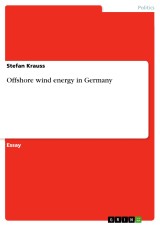Details

Offshore wind energy in Germany
1. Auflage
|
13,99 € |
|
| Verlag: | Grin Verlag |
| Format: | EPUB, PDF |
| Veröffentl.: | 13.08.2004 |
| ISBN/EAN: | 9783638299886 |
| Sprache: | englisch |
| Anzahl Seiten: | 11 |
Dieses eBook erhalten Sie ohne Kopierschutz.
Beschreibungen
Essay from the year 2004 in the subject Politics - Environmental Policy, grade: HD (High Distinction), Murdoch University (Institute for Sustainability and Technology Policy), course: Policy, Technology and Democracy, language: English, abstract: Introduction
Today′s Windmills are taller than the cathedrals of the Middle Ages and the cooling towers of the atomic age. They are standing all over Germany and are sharply criticised as well as cheeringly advocated. At present, the discourse of the use of wind energy concentrates on building numerous and large offshore wind farms. In this paper, I will investigate how ′democratic′ is the policy and decision-making process concerning wind energy in Germany. This case study aims to demonstrate the current limits of democracy and suggest how ′more democratic′ practices could be implemented. In order criticise the policy, it is necessary to describe the political context in advance. The lead off will be made by some historic and technical aspects of this technology.
Historic roots and technical aspects
Humans have been using the energy of the wind for centuries. For example, there were over 200 000 windmills all over Europe in the 18t h century. However, the purpose of these windmills was grinding grain and squeezing seeds. The first installation to generate electricity was built by the inventor Charles F. Brush from Cleveland, Ohio in 1888. Apart from some deplorable attempts of the Nazis, wind power in Germany came (back) on the agenda with the oil crisis of 1973. In order to defy the price dictated by the sheiks, there was a lot of research concerning alternative energies. However, the effects are not worth mentioning. Nowadays, there are about 16000 windmills on land in Germany in order to produce electricity. Although this alternative form of electricity production seems ecologically friendly, there are wide spread protests against these highly subsidised monsters. The main arguments are the mutilation of the landscape, insomnia due to the monotonous hum and the disco effect (red lights flashing in the night), the price decline of neighbouring properties, and the considerable number of dead birds.
Today′s Windmills are taller than the cathedrals of the Middle Ages and the cooling towers of the atomic age. They are standing all over Germany and are sharply criticised as well as cheeringly advocated. At present, the discourse of the use of wind energy concentrates on building numerous and large offshore wind farms. In this paper, I will investigate how ′democratic′ is the policy and decision-making process concerning wind energy in Germany. This case study aims to demonstrate the current limits of democracy and suggest how ′more democratic′ practices could be implemented. In order criticise the policy, it is necessary to describe the political context in advance. The lead off will be made by some historic and technical aspects of this technology.
Historic roots and technical aspects
Humans have been using the energy of the wind for centuries. For example, there were over 200 000 windmills all over Europe in the 18t h century. However, the purpose of these windmills was grinding grain and squeezing seeds. The first installation to generate electricity was built by the inventor Charles F. Brush from Cleveland, Ohio in 1888. Apart from some deplorable attempts of the Nazis, wind power in Germany came (back) on the agenda with the oil crisis of 1973. In order to defy the price dictated by the sheiks, there was a lot of research concerning alternative energies. However, the effects are not worth mentioning. Nowadays, there are about 16000 windmills on land in Germany in order to produce electricity. Although this alternative form of electricity production seems ecologically friendly, there are wide spread protests against these highly subsidised monsters. The main arguments are the mutilation of the landscape, insomnia due to the monotonous hum and the disco effect (red lights flashing in the night), the price decline of neighbouring properties, and the considerable number of dead birds.
Diese Produkte könnten Sie auch interessieren:

Herausforderungen und Chancen eines künstlerischen Wettbewerbs für ein Mahnmal in Gedenken an die Opfer des 19. Februar 2020 in Hanau

von: Katharina Meyer zu Eppendorf

29,99 €

Der erste arabisch-israelische Krieg und seine Folgen für die Palästinenser

von: Dean Sánchez Pedregoso

15,99 €














